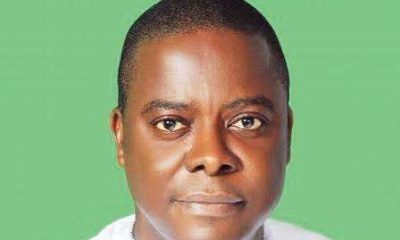Aviation
NCAA rebukes Orji Kalu over drug-use allegation, says pilots undergo strict medical checks

The Nigerian Civil Aviation Authority (NCAA) has faulted claims by Senator Orji Uzor Kalu that Nigerian pilots operate flights under the influence of drugs, describing the allegations as baseless and capable of misleading the public.
Kalu, who represents Abia North Senatorial District, had during plenary on Wednesday alleged that some pilots smoke Indian hemp before flying and accused aviation regulators of failing to conduct proper checks.
Reacting in a strongly worded statement on Thursday, the NCAA dismissed the senator’s claims as “untrue and inconsistent with the reality of Nigeria’s aviation safety system.”
The Director-General of NCAA, Captain Chris Najomo, said no pilot is allowed to fly a Nigerian-registered aircraft without both a valid licence and a current medical certificate, as required by the Nigeria Civil Aviation Regulations (Nig. CARs).
“Medical certificates are issued only after comprehensive aero-medical examinations by NCAA-authorised medical examiners,” Najomo explained. “These tests cover cardiovascular, neurological, psychological, respiratory and visual assessments, and they include mandatory screening for psychoactive substances.”
He said pilots are re-certified every six or twelve months depending on their age, and any health irregularity immediately grounds a pilot from active duty.
The NCAA chief also cited Nig. CARs Part 8.5.1.5, which forbids any flight crew member from operating within eight hours of consuming alcohol or while under the influence of drugs or other substances capable of impairing judgement or alertness.
“We also carry out random, unannounced drug and alcohol tests when there is suspicion or as part of routine safety surveillance. NCAA inspectors perform daily ramp checks to verify licences, medical certificates, and the overall fitness of crew members,” he added.
Najomo said it was therefore “misleading” to suggest that pilots are not properly monitored, stressing that Nigeria’s aviation oversight system has consistently passed International Civil Aviation Organisation (ICAO) audits under the Universal Safety Oversight Audit Programme (USOAP).
He cited the suspension of a ValueJet pilot in August 2025 for procedural violations as proof of the agency’s strict enforcement of safety standards.
Responding to Kalu’s assertion that modern aircraft can land automatically without pilot input, Najomo clarified that while advanced planes have autopilot and autoland systems, they cannot replace pilot control.
“Take-offs are entirely manual operations, and autoland systems can only be used under specific conditions and with pilot supervision. Nigeria does not have any airport certified for Category III (CAT III) operations, which would allow fully automatic landings,” he said.
The NCAA urged public officials to exercise caution when commenting on sensitive safety issues, warning that unverified claims could damage confidence in Nigeria’s globally respected aviation system.








